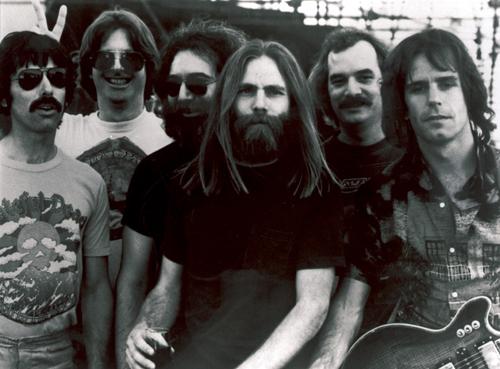Academic conference to study cultural phenomenon of The Grateful Dead

Members of the Grateful Dead, L-R, Mickey Hart, Phil Lesh, Jerry Garcia, Brent Mydland, Bill Kreutzmann and Bob Weir are shown. Grateful Dead drummer Mickey Hart says he and other members of the band never really understood the forces that turned them int The Associated Press
Nov 8, 2007
AMHERST, Mass. – Grateful Dead drummer Mickey Hart says he and other members of the band never really understood the forces that turned them into a 30-year cultural phenomenon.
“It was an alchemical thing,” Hart said. “It’s for other people to decide our fate in history, our place in the culture.”
That is exactly why fans, followers and some of those who were in the inner circle of the Grateful Dead plan to travel to the University of Massachusetts for three days in November.
This is no music festival.
UMass is hosting an academic conference on all things Dead. It will feature panel discussions on topics as diverse as the band’s innovations in sound engineering, the symbolism in Robert Hunter’s lyrics, the sociological phenomena associated with the nomadic fans who followed the Dead from concert to concert, and the band’s reflection of the American culture throughout the 30 years they were making music.
Get The Daily Illini in your inbox!
Jerry Garcia, whose death in 1995 also brought an end to the band, might have called this “Thinking Man’s Dead.” The university has labeled it “Unbroken Chain: The Grateful Dead in Music, Culture and Memory.”
“We have the opportunity to do something a bit more unique than have a bunch of people sitting around talking about favorite concert memories,” said Rob Weir (no relation to Dead guitarist Bob Weir), a visiting lecturer at the school whose history classes on pop culture use the band as their fulcrum.
More than 50 historians, authors, and critics are scheduled to participate, along with some who have a closer connection to the band, including Carolyn Garcia, Jerry’s second wife; Dan Healy, the band’s sound engineer; and Dennis McNally, the Dead’s publicist and biographer.
McNally, who has a doctorate in history from UMass, came up with the idea for the conference and suggested it to John Mullin, the dean of the graduate school.
“Here was an opportunity for us to take a broad look at the late 60s and 70s through the lens of music and culture,” Mullin said. “So I brought together a bunch of scholars on this thing and I said, ‘Can we do this with scholarly rigor?’ And the answer was, ‘Yes.'”
Invitations to the conference have been issued to the band members, but scheduling conflicts make it unlikely that any will attend, organizers said.
Guitarist Bob Weir, who will be touring in Florida with his band RatDog at the time of the conference, said in an e-mail that he’s not surprised by the academic interest.
“They’ve been teaching courses about us for 15 or 20 years,” he said. “They take us more seriously than we take ourselves, for sure. Nonetheless, I hope it spreads the word that improvisational music is here to stay.”
About 500-600 people are expected to attend the Nov. 16-18 conference, about 400 of those from off-campus. The cost to attend is $295 for the three days, with the concerts being extra. Organizers say most of the interest is coming from non-students and non-faculty.
Carolyn Garcia, a pop culture figure since her days as one of Ken Kesey’s Merry Pranksters, is probably the best known attendee. She will be taking part in a panel discussion on gender and the counterculture. Better known to many as “Mountain Girl,” she has been with the Grateful Dead scene since the 1960s, when she took part in Kesey’s LSD “acid test” experiments, for which the Dead provided the psychedelic music. She also was married to Garcia for 12 years and is the mother of two of his children.
“The Grateful Dead kind of entered the national consciousness in a broad way,” she said. “So people of a scholarly nature find things to explore there.”
From their jug band and then psychedelic beginnings, to music influenced by disco, jazz and even MTV in the 80s, the band was able to blend styles while gathering a following that was as diverse as Vermont Sen. Patrick Leahy and conservative commentator Ann Coulter, said Rob Weir, the lecturer.
“They seem to shift the way American culture shifts, which is a good reason to study them,” he said.
That’s not to say there won’t be things for the casual fan to enjoy at the conference. Many of the panel discussions will be open to the public and there will be concerts both nights by Grateful Dead tribute bands.
Hart said he hopes the conference will be able to recreate some of the positive energy of the band, which he said prompted people to go out and be good to each other.
“That’s why they are having conferences about us,” he said recently after playing with the Global Drum Project in Connecticut. “It was different from, say, the Rolling Stones, or a popular music band. Spiritually it had a different purpose.”





